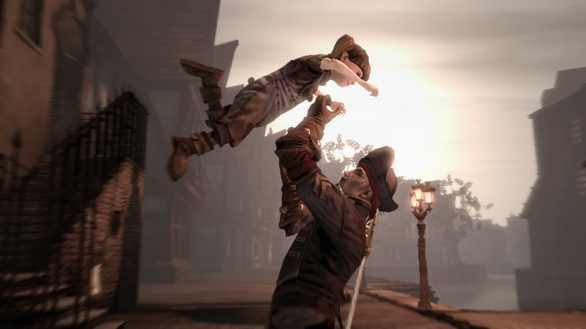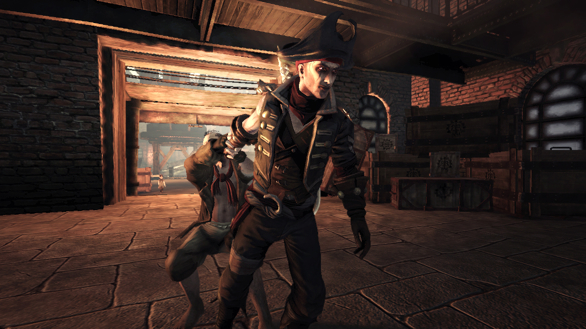When I met with Peter Molyneux at GDC this year, he discussed superhero battles that could never happen, tattletale weapons that you’ll be able to sell online and how his upcoming game Fable III will make players feel like President Obama. The respected designer behind the blockbuster Fable franchise likes to talk. That loquaciousness occasionally gets him into trouble, and has generated his reputation as someone who overpromises on high concepts but under-delivers in the execution. Molyneux’s aware of that reputation, though, and it didn’t stop him from talking about how Fable III will learn from the mistakes of its predecessor. While describing how this would look and feel, he managed to slip in a quick comment about governments using webcams for spying on citizens. I couldn’t tell if he was joking or not. Read on and see what you think.
(More on Techland: Getting a Move On: A Closer Look at PS3’s Motion Control Games)
The Fable series has always been about the relationship between the player and the gameworld. In the first Fable, your overall morality gave your character a good or evil look and the second one you got to chance to bond with your dog. What kind of relationship mechanics will you be bringing about for the player in this one?
The goal in this Fable game is to make you feel like you’re caring for the people of your kingdom and to, in return, feel cared by them. One of the characters is a butler played by John Cleese. His whole persona reacts to you; if you do morally questionable things, he’s got some amusing, slightly facetious lines in there. But, generally speaking, he really cares for you.
Molyneux goes on to talk about how the butler and the new 3D options interface represent some of the changes based on feedback from Fable II…
More than half the people used less than half of the features of the game in Fable II. The whole mechanic about changing costumes, and then people in the towns reacting to the way you were dressed? No one did that. Its not because they didn’t like the idea it’s because they were so clumsy and clunky and old-school and fiddly. It was bad game design. The old interface was like DOS, scrolling up and down to get to the right sub-menu. The new start menu is a 3D space you can walk around in, your Guild Chambers and you discover it during the game play. It’s a real event when you find it and your butler starts running around and cleaning it up. And, the rooms slowly unlock and this space reacts to your gameplay as well. If you collect clothing during the game, it gets hung in your dressing room and so on.
(More on Techland: Interview with Nintendo of America’s Reggie Fils-Aime)
You’re saying then that stuff like the Guild Chambers is the result of a mindset that says players are cheating themselves out of the full experience of the game?
I’m saying that we did an atrocious job [in Fable II] of making people realize that you could change your clothes and how that would affect their experience. The previous system lacked feedback. Now that you’ve got a butler, we’re kind of treating it as a holistic solution. We needed to tell people how important these certain things were, like weapons and treasure rooms and achievement and all of that. The butler can say, “”The butler can say, ‘Sir, you are wooing this girl. I can tell you the word on the streets is that you’re just a hippie,’ or whatever. ‘Wear this and you’re going to find out it’s much better.’ It doesn’t come across as a tutorial. It comes across as a butler. And it’s John Cleese anyway, so it’s naturally funny.”
Another example of the improvements is if we look at the map. Now, the map in Fable II was just terrible. Here, you get this idea that this is a big country and seeing the places you explore unfold is really important. That’s good. And your getting the sense there’s another place to explore is also good. You didn’t have any of that in Fable II.
But, when you become king, then you’re able to go down and look at and realize that (this is always been true of Fable) the Fable world is a living world. People get up, they go home, they go to work. The economy in certain places changes with your actions but there was no way of seeing that in Fable I or Fable II. Now we’ve got a way of seeing it. With this map, you can watch what’s happiening in [a district like] Bowerstone Industrial; you may have heard that there’s a rebel uprising. After you’re king, you’re actually having to spy on these people–very much the way our governments spy on us with webcams–and then if you think, “Oh my God, ten people piling into this house! I’ll just go down, leap in and kill them all. You absolutely have to do that and it gives you an appreciation for just how amazing the Fable world is. It is a simulated world and things do change. But we didn’t expose that to you in Fable I or Fable II.
Molyneux then describes that another way your actions will play out are in your weapons. In Fable III, you’ll be able to sell weapons online. There’s a unique customization process happens through usage. If you kill a lot of innocents, your sword will grow jagged teeth. For the opposite moral pole, it’ll grow curved and elegant. A player’s gamerscore and gamertag will be linked to weapons, so they have a legacy once they leave you.
“You’re crafting your weapons as you play… Gamerscore won’t change the power of the sword; it changes the uniqueness of the sword. Weapons will sing, and that singing will recount some of the terrible things or the noble things that have been done with this sword. Which is directly from Michael Moorcock.”
Molyneux on what it’s going to mean to be a king:
When you’re king, you can make certain judgments about certain regions. You need gold when you’re king. There’s a choice here, where it’s “Do I want to rip down these lovely little house and replace them with factories?” That judgment comes up and you can take that choice and you can see that happen.
(More on Techland: GDC 2010: Bioware’s Casey Hudson on Villains, Finding “Stolen Memory”)
What are the repercussions of rendering such a destructive judgment on a district?
Well, this is a two-act play, Fable III. Half of the action is about you being a rebel and there’s this tyrannical king that you’re going to overthrow and you’re going to get eope to followyou, and the more people you get to follow you, the faster you’ll be able to overthrow this terrible tyrannical king. Very much like any rebel throughout history. But on the journey to that, you’re going to promise lots of things to people. You’re going to promise to abolish child labor. You’re going to promise that to these travelers that you’ll reinstate their lands. You’re going to promise to stop the poor. And then, when you become king, those promises and those judgments that you end up making, people are going to come to you and say, “You promised to do this.” And that is a moral choice, whether you stick to that promise. Well, here’s the thing. That drama of doing that, we’re not going to make it easy for you. Just like Obama. He hasn’t closed Guantanomo Bay at all! Why hasn’t he closed it? It’s easy. He just picks up the phone and makes a call. What we’ve found is that there’s a really interesting and very unique story that we can tell after you become king.
Because you can compress some stuff [in the hero’s journey]?
We can compress some stuff but we can really expand some stuff. A long time ago, I had an idea for a game called Indestructibles. And my theory was (it was about superheroes) that no one tells the story of the collateral damage that Superman causes. Hancock [the movie] started doing this a little bit. So, you know, there’s Superman fighting Dr. Doom in the city of New York… [ there’s an aside about how this DC/Marvel clash couldn’t happen, to which Molyneux says “well, they’re gonna fight one day, I’m sure.”] How many times has the Empire State Building been destroyed? And the Statue of Liberty! It’s been picked up a thousand times and smashed over people’s heads a thousand times! No one complains.
[I take a moment to tell Molyneux about Marvel’s Damage Control comics, which riff on the concept of cleaning up after superhero fights.]
There’s a very normal story that is always told. The story about superheroes is the story of the big battle, but no one tells the other story [of what happens after]. In Fable III, there’s the normal hero’s journey that gets told, where you will do anything to beat the bad guy. We’re gonna make this bad guy pretty bad. But the consequences of the choices you made during that hero’s journey are then played out after that battle, very tangibly in the form of promises you make. You’ll literally have to sign a piece of paper saying, “I promise when I am king, I am going to do this, this and this.” When someone comes along and says, “Right. It’s time for my promise now.” If you don’t fulfill that promise, then that person goes away with a broken promise and all the people that follow him no longer follow you. It really is a lovely arc of story, where your consequences and your actions come to play out.



